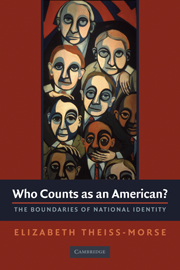Book contents
- Frontmatter
- Contents
- List of Figures
- List of Tables
- Preface
- 1 The Need for a Social Theory of National Identity
- 2 Commitment to the National Group
- 3 The Setting of National Group Boundaries
- 4 The Desire to Help the National Group
- 5 Loyalty in the Face of Criticism
- 6 Is National Identity Good or Bad?
- Appendix
- References
- Index
5 - Loyalty in the Face of Criticism
Published online by Cambridge University Press: 05 June 2012
- Frontmatter
- Contents
- List of Figures
- List of Tables
- Preface
- 1 The Need for a Social Theory of National Identity
- 2 Commitment to the National Group
- 3 The Setting of National Group Boundaries
- 4 The Desire to Help the National Group
- 5 Loyalty in the Face of Criticism
- 6 Is National Identity Good or Bad?
- Appendix
- References
- Index
Summary
In the months leading up to the United States' invasion of Iraq in March 2003, both antiwar protesters and prowar activists took to the streets. Antiwar protesters wanted to stop the United States from going to war and to let people at home and around the world know that there was no consensus among Americans concerning the approaching war. These antiwar protesters professed their support for the troops and their love of America, but they wanted the direction of U.S. policy changed. The Reverend Calvin Morris, a protester in Chicago, summed up the protesters' feelings well: “We love America because America is a place where when things are out of order, people can disagree and protest” (“Americans on Both Sides Take to the Streets” 2003). The prowar activists had a very different take on the protesters' motivations. Signs reading “America – Love It or Leave It” that cropped up at the counterprotests were reminiscent of the Vietnam War era. According to the prowar activists, the antiwar protesters could not love America. How could they love America when they were damaging the country? Sherri Tabb, one of the counterprotesters, associated antiwar protests with helping enemies of the United States when she said, “The anti-war protesters … are aiding and abetting Saddam” (“Thousands Rally in Support of War” 2003).
No one complains or takes offense when people give to charity or help in a crisis as a means of helping fellow group members.
- Type
- Chapter
- Information
- Who Counts as an American?The Boundaries of National Identity, pp. 130 - 162Publisher: Cambridge University PressPrint publication year: 2009



